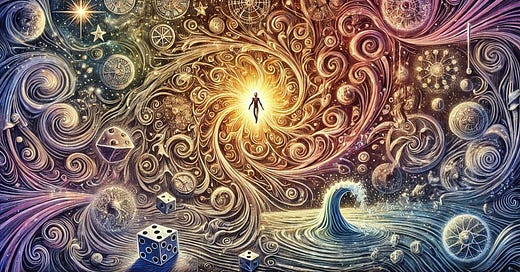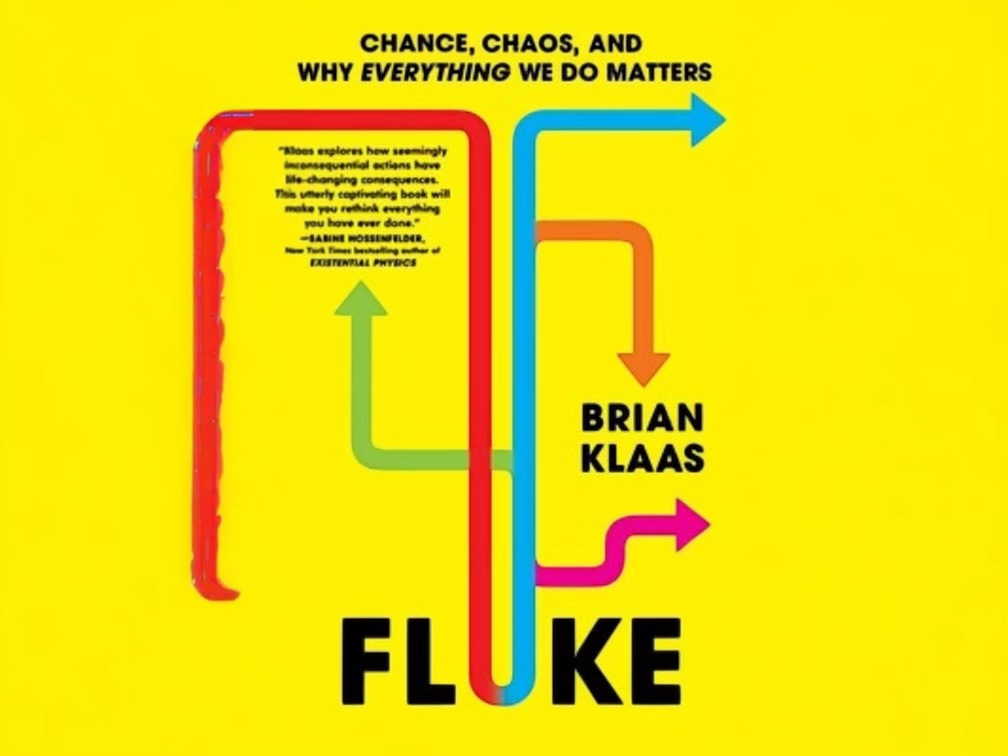In the book “Fluke: Chance, Chaos, and Why Everything We Do Matters,” the social scientist Brian Klaas dismantles the notion of a neatly ordered universe and thrusts readers into the intoxicating chaos of randomness.
Through a blend of history, chaos theory, evolutionary biology, and philosophy, Klaas offers a perspective that challenges our deeply ingrained narratives about control, causality, and purpose. This book doesn’t just inform—it invites profound introspection and awe.
As someone with a deep fascination for synchronicity and randomness, Klaas’s work feels like a companion piece to my ongoing curiosity about the mysterious interplays of chance and purpose. The psychologist Carl Jung viewed synchronicity as a way to make sense of events that defy causal explanation—moments when outer and inner worlds align in uncanny ways.
Klaas, by contrast, examines randomness not as something to be “decoded” but as an unavoidable fabric of life that can enrich our existence when embraced. The result is a narrative that both complements and subverts Jungian thought, positing that while humans may seek meaning in patterns, life’s randomness is its own kind of magic.
Fluke’s Argument: A World Without Straight Lines
Klaas opens with a provocative question: If you could rewind your life and press play, would the outcome be the same? From the flutter of a butterfly’s wings to the decision to snooze one’s alarm, Klaas makes a compelling case for how small, seemingly inconsequential actions ripple into monumental consequences. Moreover, he deftly illustrates the fragility of our existence and the absurdity of deterministic narratives.
These views resonate with my reflections on Click: The Power of Unexpected Moments of Change by Frans Johansson. Johansson also explores randomness, particularly how “click moments”—serendipitous interactions or decisions—lead to transformative events.
However, while Johansson’s work emphasizes actionable strategies for cultivating serendipity, Klaas dives deeper into the philosophical implications of randomness. He argues that randomness is not something we can control, even indirectly, but something we must learn to coexist with. This distinction sets Fluke apart, making it less of a guide and more of a lens for understanding the unpredictable world.
The Limits of Control
One of the book’s most profound insights is Klaas’s assertion that “we control nothing but influence everything.” This paradox encapsulates the human condition: while randomness reigns supreme, our choices and actions can still create ripples in the chaos.
Klaas’s personal anecdotes, such as his family history stemming from acts of violence, underscore this tension between agency and randomness. These stories challenge the hyper-individualistic myth that success and failure are entirely self-determined. Instead, Klaas urges readers to acknowledge the vast network of flukes that shape our lives—a humbling and liberating realization.
This perspective echoes the randomness I’ve observed in my own life. A chance encounter at a bookstore years ago introduced me to Jung’s work on Synchronicity, sparking a lifelong fascination with randomness and meaning.
Like Klaas, I’ve come to see randomness not as an obstacle to be overcome but as an intrinsic part of life’s beauty. Yet, unlike Jung, Klaas does not frame randomness as inherently meaningful. Instead, he challenges readers to derive meaning from their response to randomness, not from the randomness itself.
Chaos, Resilience, and Meaning
Klaas’s treatment of randomness is not nihilistic; it’s empowering. He argues that embracing chaos can lead to greater resilience and intentionality. “Over-optimization creates fragility,” he warns, pointing out that life’s richest experiences often emerge from inefficiency and unpredictability.
This insight recalls Johansson’s advice to create environments conducive to serendipity. Both authors advocate for leaving space in our lives for exploration, play, and the unexpected.
But Klaas goes further, questioning whether humanity’s obsession with progress and order has inadvertently amplified chaos. He points to institutions and systems—designed for stability—that can inadvertently perpetuate destructive forms of randomness when they fail to adapt.
His critique of over-optimized systems resonates with the randomness inherent in nature: just as ecosystems thrive on diversity and unpredictability, so too must human lives and societies allow room for the unexpected.
A Jungian Lens on Fluke
Reading Fluke through the lens of Jung’s synchronicity adds a layer of depth to Klaas’s ideas. Jung believed that coincidences could reveal a hidden order, a meaningful pattern within chaos.
Klaas, however, is skeptical of such interpretations, suggesting that humans project meaning onto randomness because we struggle to accept its indifference. While Jung saw synchronicity as a bridge between the inner and outer worlds, Klaas views randomness as a stark reminder of the universe’s unpredictability.
This tension between Klaas’s realism and Jung’s mysticism invites readers to grapple with their own beliefs. Are we protagonists in a meaningful narrative, or are we merely riding the waves of chance? Fluke doesn’t answer this question definitively, but it provides tools for thinking critically about the stories we tell ourselves.
Living in the Flux
What makes Fluke so compelling is its ability to shift readers’ perspectives on randomness from something to be feared to something to be embraced. Klaas’s writing is at once playful and profound, balancing complex ideas with engaging storytelling.
His final chapters, which explore the illusion of free will and the implications of chaos for morality and justice, are particularly thought-provoking. They challenge readers to consider how acknowledging randomness can lead to a life filled with awe and intention.
As I turned the last page, I found myself reflecting on my own journey with randomness. Fluke reinforced a lesson I’ve long grappled with: the future is not a puzzle to be solved but a river to be navigated. In this, Klaas’s work aligns with the Taoist principle of wu wei, or effortless action—letting go of the need to control and instead flowing with life’s natural rhythms.
In a world increasingly obsessed with certainty, Fluke is a refreshing reminder that life’s beauty lies in its unpredictability. It’s a book that not only deepens our understanding of chance but also inspires us to live more fully within the chaos.
Whether you’re a believer in synchronicity or a skeptic of patterns, Klaas’s insights will leave you questioning everything—and perhaps, like me, finding comfort in the randomness of it all.
Join us today as a paid member supporter. Or feel free to tip me some coffeehouse love here if you feel so inclined.
Your contributions are appreciated!
Every bit counts as I strive to deliver high quality feature articles into your inbox on a regular basis. Never any paywalls, just the opportunity to foster community, connection, and conversation one book at a time.






